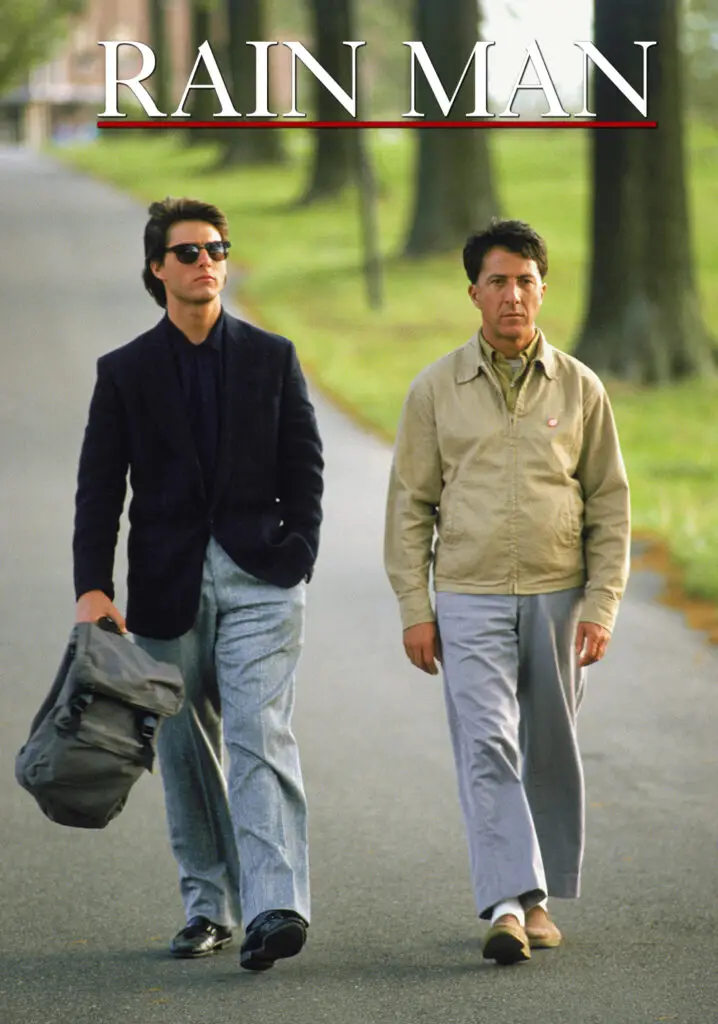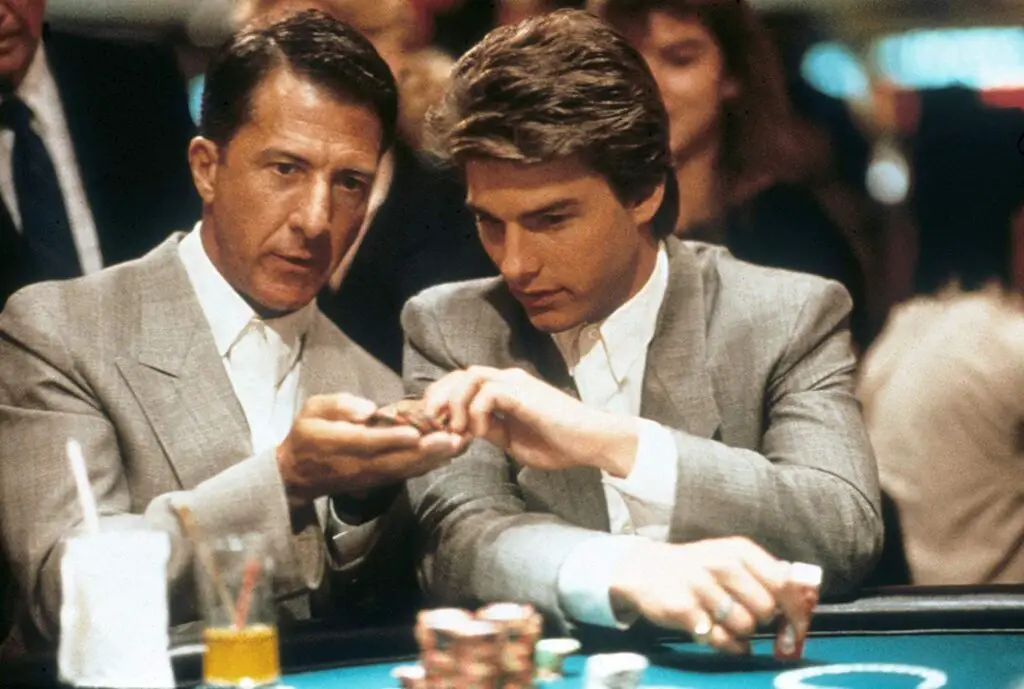Beyond Stereotypes: How Rain Man Revolutionized the Perception of Autism
Rain Man is a movie that has become a classic in the world of cinema, and one still spoken of in today’s neurodiverse world. Released in 1988, the film tells the story of Charlie Babbitt (Tom Cruise), a self-centered and money-driven, mid-20s car dealer, who discovers he has an older brother named Raymond (Dustin Hoffman), whom he never knew existed. What makes Raymond unique is that he has autism, and his depiction in the movie has been a topic of debate among the autism community for many years. We’ll talk about the autism media stereotypes later.
 One of the first things I wanted to know before watching the movie was the meaning behind the title, Rain Man. Well, the explanation is simple, and it is actually pretty sweet. Viewers learn in the movie that Charlie actually did know his older brother Raymond when he was a baby, and called him Rain Man in his 20-month-old attempt to call him by his name. However, there was an unfortunate safety incident between the two that resulted in the parents sending Raymond away to an institution.
One of the first things I wanted to know before watching the movie was the meaning behind the title, Rain Man. Well, the explanation is simple, and it is actually pretty sweet. Viewers learn in the movie that Charlie actually did know his older brother Raymond when he was a baby, and called him Rain Man in his 20-month-old attempt to call him by his name. However, there was an unfortunate safety incident between the two that resulted in the parents sending Raymond away to an institution.
When the movie Rain Man was released, it was one of the first movies to depict a character with autism, and it brought autism into the public eye. The movie was very successful and won four Academy Awards. Hoffman’s performance was praised by many people for its authenticity and sensitivity towards autism, and it helped raise awareness about autism and the challenges that come with it.
However, Hollywood’s portrayal of autism has been criticized by some people in the autism community for being too stereotypical and one that actually perpetuated autism stigmas and pathologization of being on the spectrum. For instance, Raymond’s repetitive behavior and anxiety, his obsession with routines and numbers, his typecasting as a high-functioning savant, and his lack of eye contact and social skills are all characteristics associated with SOME individuals with autism, but certainly not all.
Some critics have also pointed out that the movie focuses too much on Charlie’s journey and not enough on Raymond’s experience. They argue that the movie portrays Raymond more as a plot device than a real character and that it fails to capture the complexity of his inner life.
Despite its flaws, Rain Man’s depiction of autism is still relevant today, more than 30 years after its release. The movie helped raise awareness about autism and the challenges faced by people with autism and their families. It showed that people with autism can have unique abilities and that they deserve respect and understanding.

Another strength of the movie is the relationship between Charlie and Raymond. At first, Charlie sees Raymond as an inconvenience and a financial burden, and even thought his behaviors and condition “was curable.” However, over the course of their shared journey, he comes to understand and appreciate his brother’s unique perspective. He continues to ask, “Why didn’t someone tell me I had a brother?”
In the end, Charlie becomes protective of Raymond, and grows to love him. The movie shows that people with autism can have valuable insights and abilities that are not always recognized by society.
However, the movie also has some weaknesses in its portrayal of autism. As mentioned earlier, Raymond’s character is somewhat stereotypical, and the movie does not explore the full range of behaviors and abilities associated with autism.
The movie also perpetuates some myths about autism, such as the idea that people with autism lack emotions or empathy. While this may be true for some people with autism, it is not true for everyone. It also goes against the campaign of helping people to understand that knowing one person with autism is simply just knowing ONE person with autism. No two are similar, just like human beings in general.
Despite these criticisms, Rain Man remains an important movie in the history of autism representation. It helped raise awareness about autism and the challenges faced by people with autism and their families. It showed that people with autism can have unique abilities and that they deserve respect and understanding.
It also paved the way for other movies and TV shows that depict characters with autism, such as The Good Doctor and Atypical. Rain Man also highlights the struggles and stigmatization faced by individuals with autism and their families.
The character of Raymond is institutionalized and separated from his family, which was common practice in the past. The movie shows how the lack of understanding and resources can have a devastating impact on the lives of people with autism and their families.
Fortunately, over the past few decades, there has been significant progress in the understanding and acceptance of autism. There is now more awareness of the spectrum of behaviors and abilities associated with autism, and there are many resources available for individuals with autism and their families.
One of the biggest changes has been the shift towards an approach that emphasizes acceptance and understanding of individuals with autism. This approach recognizes that people with autism have unique strengths and abilities, and it seeks to provide them with the support and resources they need to live fulfilling lives. There is also more recognition of the importance of including individuals with autism in mainstream society and giving them the opportunity to participate in all aspects of life.
My Take on The Rain Man and Other Movie Portrayals
To me, Rain Man is a strange movie. On one hand, it portrays autism as this bizarre, almost mystical mental disease kind of like a curse from the gods. But one the other hand, it also brought a lot of awareness to autism when most people didn’t know about, and hopefully this led to more people doing their own research about it.
This movie has been a positive in many ways but also negative in others, so it’s really been a mixed bag in terms of being helpful in understanding individuals who are neurodivergent.
But this movie was the beginning of society’s knowledge and acceptance for autism and it has increased and because of the work people are doing today with new movies, books, and social media. I am hopeful this acceptance will only increase more and more, and we can be happy this movie started it.
In recent years, there have been many movies and TV shows that depict characters with autism in a more nuanced and diverse way. For example, the TV show Atypical portrays a teenager with autism who is navigating the challenges of high school and relationships, while the 2016 movie The Accountant depicts an adult with autism who is a skilled accountant and fighter.
Rain Man’s depiction of autism has both strengths and weaknesses. While the movie’s portrayal of Raymond may be somewhat stereotypical, it helped raise awareness about autism and the challenges faced by people with autism and their families. Moreover, the movie’s emphasis on the importance of acceptance and understanding of individuals with autism is still relevant today.
Despite the progress that has been made, there is still much work to be done to ensure that individuals with autism receive the support and resources they need to live fulfilling lives. By continuing to increase awareness and understanding of autism, we can create a more inclusive and accepting society for all individuals.
Hollywood needs to continue to improve its accuracy of portrayals of individuals with differences so that the movies can foster acceptance, rather than polarization.
Additional Misconceptions That Lead To Autism Stigmas and Stereotypes
Learn more about other stigmas and stereotypes that autistics face:
· Why Labeling People Can Lead to Stereotyping and Discrimination
· Autism Media Stereotypes: We’re Not All Geniuses, Savants, or Lonely
· Absurd Plot About Autism and Evolution and Why It’s Harmful
· Moving Past the Tired Conspiracy Theory of Vaccines and Autism
· Discover the Powerful Bond Between Autism and Pets
· 3 Reasons Why Pathologizing Crushes Autism Acceptance and Inclusion
· The Hidden Hurdles: Challenging Autism Stigmas in Today’s Politics
· History of Autism: Revealing Shocking Mysteries from the Past
· Knocking Down the Stigma to Autism Obsession
